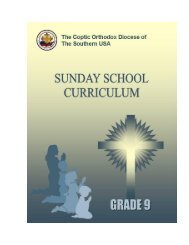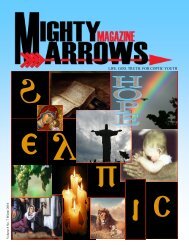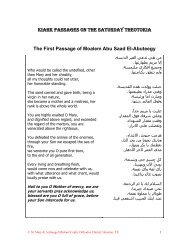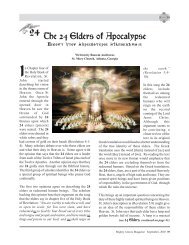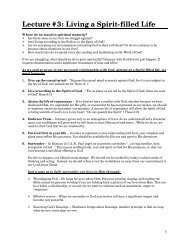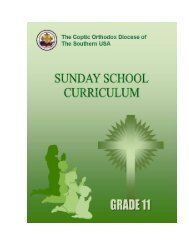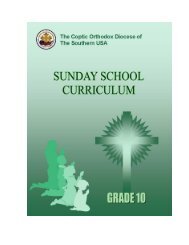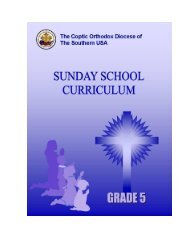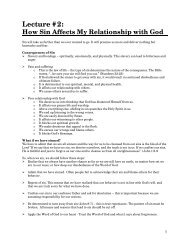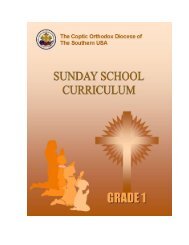Grade 12 - Coptic Orthodox Diocese of the Southern United States
Grade 12 - Coptic Orthodox Diocese of the Southern United States
Grade 12 - Coptic Orthodox Diocese of the Southern United States
You also want an ePaper? Increase the reach of your titles
YUMPU automatically turns print PDFs into web optimized ePapers that Google loves.
Sunday School Curriculum <strong>Grade</strong> <strong>12</strong><br />
Those who deny <strong>the</strong> evidence <strong>of</strong> a designer are a lot like <strong>the</strong> foolish fisherman. If he fails to catch<br />
a fish, he says, ―Aha! This proves <strong>the</strong>re are no fish!‖ He does not want to consider <strong>the</strong> possibility that<br />
he might be an inept fisherman. Since science cannot measure <strong>the</strong> intangible or <strong>the</strong> supernatural, <strong>the</strong>re<br />
are many people who say, ―Aha! There is no Creator.‖ Foolish fishermen deny <strong>the</strong> evidence that God<br />
exists although He has left His fingerprints all over creation.<br />
D. The reliability <strong>of</strong> <strong>the</strong> Bible<br />
Every religion has its own holy book, but <strong>the</strong> Bible is different from all <strong>the</strong> o<strong>the</strong>rs. It is to be <strong>the</strong><br />
very Word <strong>of</strong> God, not dropped out <strong>of</strong> <strong>the</strong> sky but God-brea<strong>the</strong>d it and infused it with His power as<br />
He communicated His thoughts and intent through human writers.<br />
About forty different writers, on three different continents, wrote <strong>the</strong> Bible over a period <strong>of</strong> 1500<br />
years. They addressed a wide variety <strong>of</strong> subjects, and yet <strong>the</strong> individual books <strong>of</strong> <strong>the</strong> Bible show a<br />
remarkable consistency within <strong>the</strong>mselves. There is a great deal <strong>of</strong> diversity within <strong>the</strong> Bible, at <strong>the</strong><br />
same time displaying an amazing unity. It presents an internally consistent message with one great<br />
<strong>the</strong>me: God‘s love for man and <strong>the</strong> great lengths to which He labors to demonstrate that love.<br />
One o<strong>the</strong>r aspect <strong>of</strong> <strong>the</strong> Bible is probably <strong>the</strong> greatest evidence that God exists and that He has<br />
spoken to us in His holy book: fulfilled prophecy. The Bible contains hundreds <strong>of</strong> details <strong>of</strong> history,<br />
which were written well in advance <strong>of</strong> <strong>the</strong>ir fulfillment. Only a sovereign God, who knows <strong>the</strong> future,<br />
can write prophecy that is accurately and always - eventually - fulfilled. Fulfilled prophecy is just one<br />
example <strong>of</strong> how God shows He exists and that He is not silent. How else do we explain <strong>the</strong> existence<br />
<strong>of</strong> history written in advance?<br />
The Existence <strong>of</strong> God<br />
“And God said to Moses, „I AM WHO I AM‟”(Ex 3:14)<br />
The relation <strong>of</strong> faith and reason is <strong>of</strong>ten discussed in terms <strong>of</strong> whe<strong>the</strong>r God‘s existence can be<br />
proved and whe<strong>the</strong>r such pro<strong>of</strong> would be adequate to bring a non-believer to faith. Although reason<br />
alone may not bring individuals to faith in God, believers are none<strong>the</strong>less able to give rational reasons<br />
for <strong>the</strong>ir faith in God.<br />
Our knowledge <strong>of</strong> God and <strong>the</strong> certainty <strong>of</strong> His existence comes through <strong>the</strong> personal experience<br />
<strong>of</strong> Him in our lives. Rational reasons can help us to appreciate <strong>the</strong> reality <strong>of</strong> God. It is hoped that <strong>the</strong><br />
following reasons will enhance <strong>the</strong> faith <strong>of</strong> those who already know God and worship Him in <strong>the</strong>ir<br />
lives. It is also hoped that <strong>the</strong>se reasons will help those who are still searching.<br />
The Three Types <strong>of</strong> A<strong>the</strong>ists:<br />
1. The Absolute A<strong>the</strong>ist: This is one who denies <strong>the</strong> absolute existence <strong>of</strong> God.<br />
2. The Providential A<strong>the</strong>ist: Also called a ―Deist.‖ The term ―deism‖ (from <strong>the</strong> Latin deus, ‗god‘)<br />
is <strong>of</strong>ten used in a general sense to refer to that view <strong>of</strong> God, which maintains God‘s<br />
creatorship, but denies a continuing divine involvement with, or special presence within, that<br />
creation. They deny God‘s providential dealings and care for <strong>the</strong> world. It is <strong>of</strong>ten contrasted<br />
with ―<strong>the</strong>ism‖ (from Greek Theos, ‗god‘), which allows for continuing divine involvement<br />
within <strong>the</strong> world.<br />
3. The Practical A<strong>the</strong>ist à This is a group that does not deny <strong>the</strong> being <strong>of</strong> God, but by <strong>the</strong>ir<br />
actions and lifestyle, by <strong>the</strong>ir evil and neglect <strong>of</strong> God, <strong>the</strong>y act as though <strong>the</strong>re were no God.<br />
66 NOVEMBER



